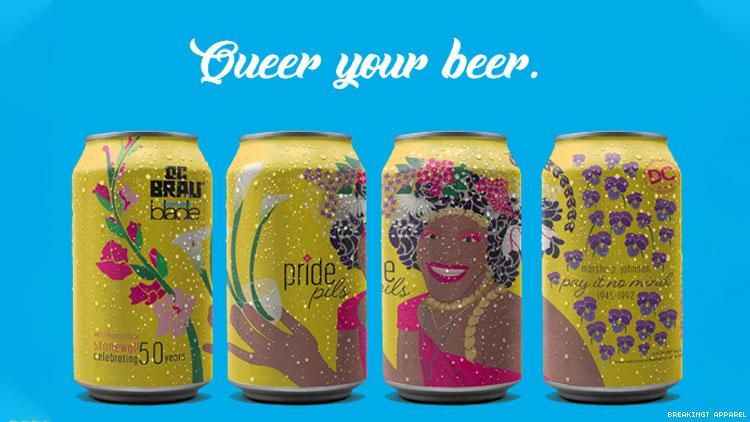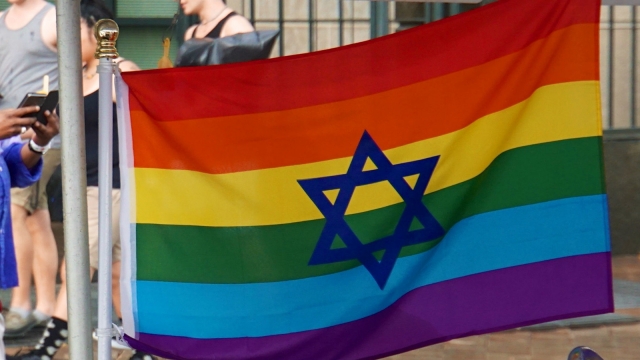A look back at the Cannes Film Festival’s history of LGBTQ representation

Port Authority, mk2 films
The 72nd annual Cannes Film Festival announced its lineup this week, boasting eight LGBTQ-inclusive films, including Port Authority, which is the first Cannes premiere to star a transgender woman of color.
In honor of this breakthrough, we’re taking a look back at the ups and downs of Cannes’ history of LGBTQ representation. Below is a timeline of notable LGBTQ-inclusive feature films that have screened at Cannes throughout the years.
Our synopsis discusses the good, the bad, and the ugly, including various harmful LGBTQ tropes that have occurred throughout the years. The list also includes spoilers for several films, so if you haven’t seen them, be forewarned!
1962 – Advise and Consent (dir. Otto Preminger) This political drama uses a past love affair between two senators as a plot device that leads one of them to commit suicide, which is representative of a long-running trope that LGBTQ love stories cannot end on a happy note.
1969 – if… (dir. Lindsay Anderson) This film is one of several to screen at Cannes in the 1960s that feature gay men as sadistic murderers. if… won the Golden Palm, the most prestigious award at Cannes.
1970 – Tell Me That You Love Me, Junie Moon (dir. Otto Preminger) This romantic drama includes a gay paraplegic who moves in with the main character. The film shows the social prejudice three social outcasts face in their lives.
1982 – Another Way (dir. Károly Makk, János Xantus) This Hungarian political drama follows an army officer’s wife and a journalist who fall in love in the aftermath of the failed Hungarian uprising. Both women are shot, one fatally, invoking another harmful trope that would persist for decades. The film is awarded Cannes’ Best Actress Award for Jadwiga Jankowska-Cieślak.
1984 – Another Country (dir. Marek Kanievska) This film follows a group of schoolboys struggling to fit in, with a cast that includes Rupert Everett and Colin Firth. One boy, Bennett, must navigate what it means to be openly gay in the 1930s, dealing with bullying and homophobia. The film is awarded Best Artistic Contribution. (not to be confused with the James Baldwin novel from the ’60s, with the same title)
1985 – Kiss of the Spider Woman (dir. Héctor Babenco) This film follows a revolutionary who falls in love with a transgender woman while in prison only to find that she is working against him. William Hurt is awarded Best Actor, as a cisgender man playing the role of a trans woman.
1986 – Mona Lisa (dir. Neil Jordan) The film follows George as he realizes he has been bamboozled by a queer, female sex worker who tricks him into helping her find her lover, promoting the trope and stereotype that queer people use their sexuality for trickery.
1992 – Basic Instinct (dir. Paul Verhoeven) Nick Curran is a police detective investigating the brutal murder of a prominent rockstar. His prime suspect is a bisexual author named Catherine, who is found to be psychopathic and obsessive. The LGBTQ community strongly criticized the film upon its release.
1993 – Farewell, My Concubine (dir. Chen Kaige) This Chinese drama follows two actors who play across one another at the Beijing Opera House. Cheng specializes in female parts while Duan plays the male lead. The film discusses gender identity and is awarded the Golden Palm.
1996 – Crash (dir. David Cronenberg) This thriller explores the human tendency to eroticize danger, featuring LGBTQ relationships. The characters become turned on by watching car crashes. It wins the Jury Special Prize, which is awarded to works that “embody the spirit of inquiry.”
1997 – Happy Together (dir. Wong Kar-wai) Following Lai and his boyfriend Ho as they move to Argentina in hopes of a better life, this film explores how tumultuous relationships can build only to fall apart. Happy Together wins Cannes’ Best Director Award.
1998 – Velvet Goldmine (dir. Todd Haynes) -This musical drama follows fictional glam rocker Brian Slade who fakes his own death only to get caught. Ten years later, a journalist wants to tell the story of Slade’s downfall. The film is awarded Best Artistic Contribution.
1999 – Todo sobre mi madre (dir. Pedro Almodóvar) All About My Mother is a Spanish drama film about Manuela, who recently lost her son, as she goes in search of his father. There are several trans characters and the film touches on the HIV/AIDS crisis. Almodóvar is awarded Cannes’ Best Director Award.
2001 – Mulholland Drive (dir. David Lynch) A woman survives a car crash, suffering from amnesia. She meets another woman who helps her solve the mystery behind what happened. Lynch wins Cannes’ Best Director Award.
2003 – Elephant (dir. Gus Van Sant) This film is based on the shooters who terrorized Columbine, but there’s a twist. The film hints at a romantic relationship between Alex and Eric. Elephant wins the Golden Palm and Cannes’ Best Director Award.
2007 – The Edge of Heaven (dir. Fatih Akin) This film is a collaborative feature from Turkey and Germany that follows a lesbian couple, one of whom is thrown into prison while the other is killed. The Edge of Heaven wins Cannes’ Best Screenplay Award.
In 2010, Cannes becomes the third European film festival to create an award for LGBTQ films (following Berlin in 1987 and Venice in 2007.) The Queer Palm is an independently funded award that recognizes films for their treatment of LGBTQ themes.
Upon the creation of this award, more LGBTQ-inclusive films than ever before began to premiere at Cannes. Instead of barely seeing one LGBTQ-inclusive narrative per year, Cannes began to boast large selections nearly every year. Eleven LGBTQ-inclusive films premiere in 2011, thirteen in 2012, 2014, and 2015, eight in 2013, twelve in 2016, and seven in 2017.
As of now, the 2018 Cannes Film Festival holds the record with fifteen LGBTQ-inclusive selections screened that year. Several of these selections also won general awards during their respective years, most notably, the highly controversial Blue Is the Warmest Color (dir. Abdellatif Kechiche), which won the Golden Palm in 2013. LGBTQ representation at Cannes has continued to flourish as the years have progressed.
Winners of the Queer Palm include: Kaboom (dir. Gregg Araki) in 2010, Beauty (dir. Oliver Hermanus) in 2011, Laurence Anyways (dir. Xavier Dolan) the 2012 feature in which yet another cis male actor plays a trans woman, L’Inconnu du lac (dir. Alain Guiraudie) in 2013, Pride (dir. Matthew Warchus) in 2014, Carol (dir. Todd Haynes) in 2015, the documentary The Lives of Thérèse (dir. Sébastien Lifshitz) in 2016, 120 BPM (Beats Per Minute) (dir. Robin Campillo) which was also awarded Grand Prix in 2017, and 2018’s dangerous and controversial Girl (dir. Lukas Dhont).
This year’s Cannes Film Festival runs from May 14th – May 25th. For a full list of LGBTQ-inclusive films premiering at Cannes this year, click here.
www.glaad.org/blog/look-back-cannes-film-festivals-history-lgbtq-representation






